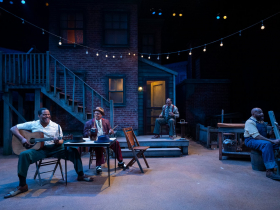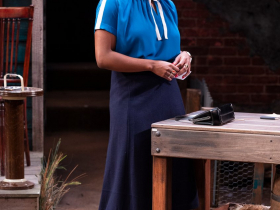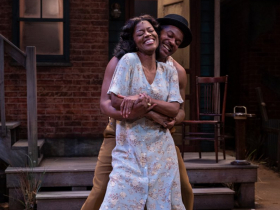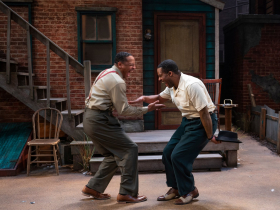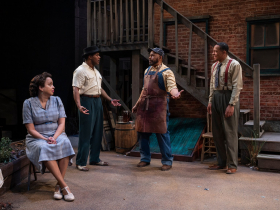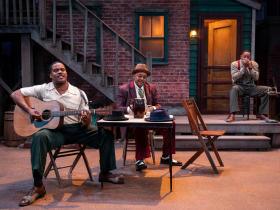Rep’s ‘Seven Guitars’ Offers Jaunty Characters, Juicy Dialogue
August Wilson play is uneven, but insightful about 1940's-era Black American lives.
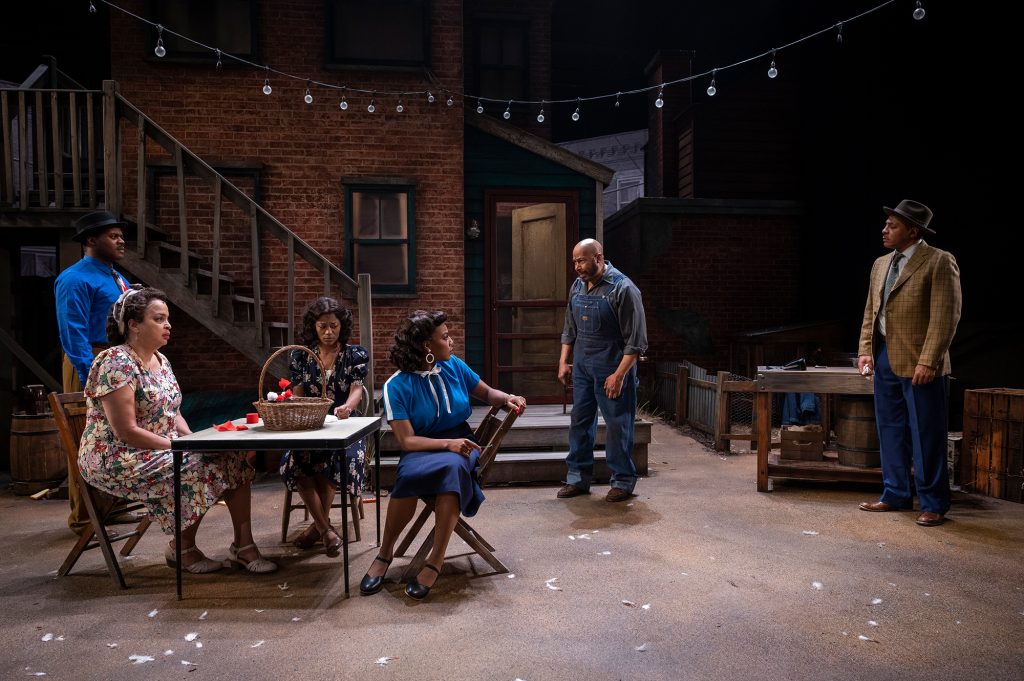
Milwaukee Repertory Theater presents August Wilson’s Seven Guitars in the Quadracci Powerhouse March 7 – April 2, 2023. Pictured: Dimonte Henning, Marsha Estell, Kierra Bunch, Saran Bakari, Kevin Brown and Vincent Jordan. Photo by Michael Brosilow.
The Milwaukee Rep deserves to take bows for now staging eight plays by August Wilson, chronicler of the African American experience. Seven Guitars – set again in Pittsburgh, focusing on the 1940s and running through April 2 at the Quadracci Playhouse — means the Rep is nearing completion of his famous Pittsburgh Cycle of 10 plays (sometimes called the Century Cycle) illuminating every decade of the 20th century black experience.
Wilson is often called the American Shakespeare for his ambition and success – many of the plays are superb. But not all are of equal worth. While Seven Guitars offers some of his brilliance with monologues, repartee and poetic forays into black spiritualism and family roots, it also shows his construction dilemma in turning a melodramatic situation into a three-hour drama.
But as usual, with a vocally forceful assembly of actors (many imported just for this production) and a superb technical staff, the Rep is providing entertaining personalities and delightful putdowns and conversations as friends of a young blues guitarist gather in a backyard surrounded by roosters and dogs to muse about his violent passing and re-live his appeal and foibles.
Director Ron OJ Parson, a veteran of Wilson productions, knows this territory well and thus works to stage it naturally, letting the actors move in tight spirals – as if ignoring the audience, though many don’t — to emphasize the sense of interaction and common upbringing. But he is too assured of the experience and vocal power of his cast (which must sing as well as interpret). So he gives them too much space to force character connectivity on their own, wandering in and out with insufficient reasons. This is a weaker Wilson play in structure that needs careful nurturing to be more than a nifty assortment of stoop chats and stereotypes. The conversations fill time pleasantly, but only a few move the characters and their stories forward in non-obvious ways.
Yet some in the cast are ready to be cut loose. Bryant Bentley as Red and Marsha Estell as Louise deliver the wittiest observations as if born to them while Vincent Jordan as Canewell is not far behind in hysterical echoes of rooster talk and nimble movement as the harmonica player.
The technical staff has standouts in costume designer Yvonne L. Miranda providing the full flash and reality of 1940s street and nightclub fashion while sound designer André Pluess lays down interesting snippets of historic blues and eerie visionary one-notes to deepen the story.
Dimonte Henning, a busy Milwaukee familiar, offers his best work to date as Floyd pairing with Kierra Bunch as Vera in a bittersweet romance between a savvy suspicious woman and an attractive womanizer heading for success in Chicago. He sometimes pushes his charm too much and she slides sometimes into facial games. But overall their romantic scenes along with the bantering of the ensemble, playing cards or listening to boxing on the radio, are the winning sequences for the patrons.
Entering halfway through, Saran Bakari saunters winningly as Ruby though we never quite believe the con she is playing.
The play rises and falls on Hedley, the mind-sick and body-sick chicken wringer (you may never eat poultry again watching Hedley squeeze out blood while preparing sandwiches) who has visions of the money his father meant to leave him and dreams in his older years of having a child to lead Black Americans to glory.
We have to believe not only in his mania, but also the tolerance of those around him for his frightening antics – the mental dilemma that makes his excesses seem harmless. The story hides these melodramas for a while through the vocally impressive and physically commanding actor, Kevin Brown, but eventually the way he erupts and subsides needs more psychological support than director and actor are providing. And the lack of genuine connectivity affects others in the cast.
Along the way, as compensation, Wilson again provides gems of insight into mystical visions, backyard and barnyard jokes, loss of power and that pervading sense of despair that also informs the plot. The Pittsburgh Cycle moves forward, but the road here is a bit slippery.
Seven Guitars Gallery
Dominique Paul Noth served for decades as film and drama critic, later senior editor for features at the Milwaukee Journal. You’ll find his blogs here and here.
Review
-
Eating Burmese in Bay View
 Dec 13th, 2025 by Cari Taylor-Carlson
Dec 13th, 2025 by Cari Taylor-Carlson
-
Casablanca Is a Milwaukee Success
 Nov 30th, 2025 by Cari Taylor-Carlson
Nov 30th, 2025 by Cari Taylor-Carlson
-
Oh, Those Witty 18th Century Brits
 Nov 24th, 2025 by Dominique Paul Noth
Nov 24th, 2025 by Dominique Paul Noth
Theater
-
Oh, Those Witty 18th Century Brits
 Nov 24th, 2025 by Dominique Paul Noth
Nov 24th, 2025 by Dominique Paul Noth
-
Skylight’s Holiday Show Is Lots of Fun
 Nov 16th, 2025 by Dominique Paul Noth
Nov 16th, 2025 by Dominique Paul Noth
-
Rep’s ‘Come From Away’ Is a Triumph
 Nov 10th, 2025 by Dominique Paul Noth
Nov 10th, 2025 by Dominique Paul Noth

